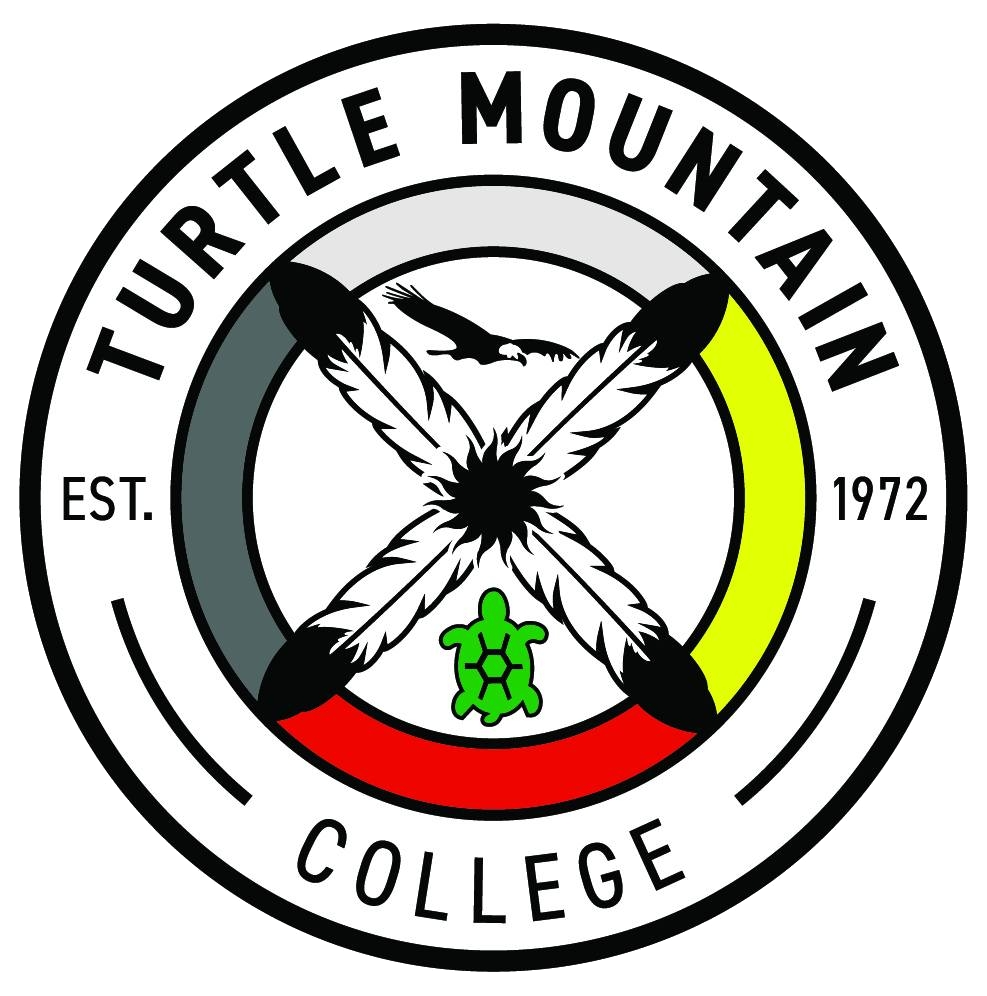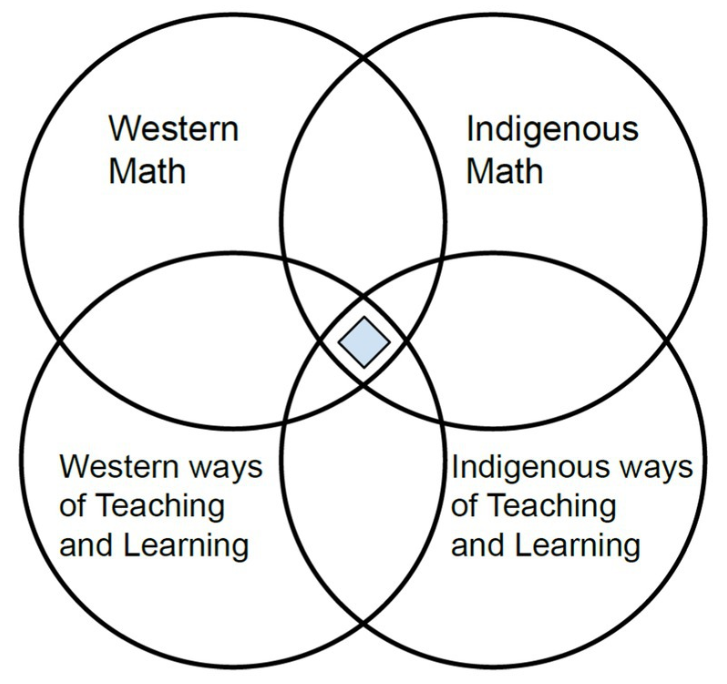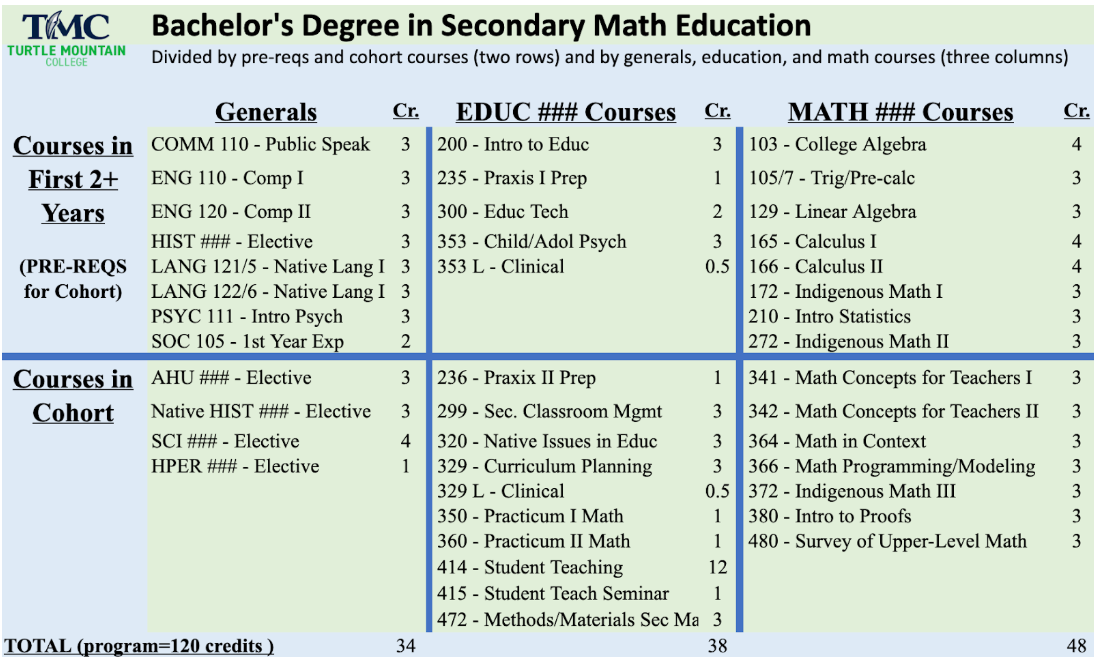

A Bachelor of Science in Education - Secondary Mathematics is designed to produce graduates who are qualified to pursue careers as math teachers in grades 5-12 in the Turtle Mountain area or across North Dakota and the United States. Candidates who complete the program will have passed all three Praxis examinations and completed student teaching to become a highly-qualified licensed math teacher. The program is accredited by the Higher Learning Commission and the North Dakota Department of Public Instruction. The program will produce teachers who are fully equipped to engage students with Indigenous ways of teaching and learning as well as Indigenous math, all balanced with the Western perspective to advance the opportunities for all students.
Candidates entering the 4-year program should declare for a B.S. in Secondary Math Education degree in their freshman year. Candidates will take approximately two math courses each semester beginning their freshman year and two education courses each semester beginning their sophomore year. A cohort structure begins their junior year with each cohort capped at 15 students. Cohorts start every two years. The program is designed to ensure candidates take the required courses in 8 semesters.
Before colonization and assimilation, Indigenous communities had a mathematics system, but today various communities have limited knowledge about Indigenous math. The mission of the Secondary Mathematics Education Bachelor of Science degree program at Turtle Mountain College is to prepare future middle school and high school math teachers with content and pedagogical knowledge from a balanced perspective of Western and Indigenous ways of knowing – two-eyed seeing. “We have come to understand that Western mathematics and Indigenous mathematizing can be viewed as having complementary strengths. Recognizing the strengths of each will maximize mathematical learning for all students” (Sterenberg & O’Conner, 2018, p.185, cited in Meyer & Aikenhead, 2021, p.129-130). Strong K-16 math education is essential for economic and political self-determination and self-sufficiency of Native nations.
Review the TMC Academic Calendar for admissions & registration deadlines for each semester.
Students who successfully complete the program will be proficient in six Program Learning Outcomes. Each of the six Program Learning Outcomes (PLOs) has a one-sentence description, an assessment plan, and the list of the core courses designed/assigned for students to reach proficiency in that PLO.
Western Math PLO:
• Students will demonstrate proficiency in North Dakota required content standards.
• Assessment – Praxis II results, ND ESPB Standards 11010.1-5
• Core Courses – MATH 165, MATH 166, MATH 366, MATH 380, MATH 480
Indigenous Math PLO:
• Students will articulate Indigenous mathematical ways that are place-based and language-specific.
• Assessment – Community presentations
• Core Courses – MATH 172, MATH 272, MATH 372
Two-Eyed Balanced Math PLO:
• Students will articulate the connections between Indigenous Math and the North Dakota Secondary Math Content Standards.
• Assessment – Math modeling project
• Core Courses – MATH 341, MATH 342, MATH 364
Western Education PLO:
• Teacher candidates will demonstrate proficiency in the North Dakota required pedagogical standards.
• Assessment – Praxis II results, ND ESPB Standards 11010.6-7, InTASC Assessments 1-10
• Core Courses – EDUC 299, EDUC 329, EDUC 353, EDUC 472
Indigenous Ways of Teaching and Learning PLO:
• Teacher candidates will implement Anishinaabe ways of teaching, learning, and knowing (e.g. decolonizing, community, and place-based education).
• Assessment – Community presentations
• Core Courses – EDUC 320, MATH 172, MATH 272, MATH 372
Two-Eyed Balanced Education PLO:
• Teacher candidates will implement pedagogical practices at the overlap between Western education and Indigenous ways of teaching, learning, and being (e.g. collaborative, student-centered, equitable, and caring pedagogical practices).
• Assessment – EDUC 472 Unit Plan
• Core Courses – EDUC 472, EDUC 414/415
The six PLOs are in alignment with the Indigenous Math Education Framework (see below). Each of the four circles are distinct and can stand on their own. Further, each circle is self-justifying, meaning that it does not need justification nor validation from another circle. Specifically, Indigenous Math does not need to be validated or verified by Western Math to be considered legitimate. Third, each circle is equivalent in size showing equivalent value. This is the desired and ideal scenario that the program continues to pursue. Lastly, the four circles are all interconnected. Despite the little black lines showing rigid boundaries between the intersection and exclusion areas, these four topics are interconnected, interdependent, and always shifting in relationship with each other.

Credit Requirement Breakdown
Total Credits for the 4-year Program: 120
Total Credits for the General/Core: 34
Total Credits for the EDUC portion: 38
Total Credits for the MATH portion: 48
Program Degree Graduation Requirements:
Overview of entire program:
